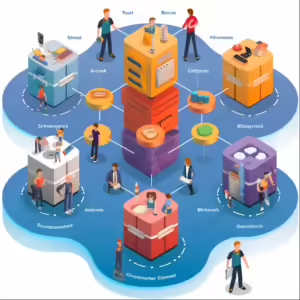Version Control System: A cornerstone of modern software development
In the world of software development, Version Control System (VCS) is an essential tool that allows developers to efficiently manage and track changes to code. This article provides a comprehensive insight into the meaning, functionality and different types of version control systems and their role in modern software development.
What is a Version Control System?
A version control system is a software tool that helps developers track changes to the source code of a software project. It allows multiple developers to work on the same project at the same time by tracking each individual's changes and providing the ability to combine these changes if necessary.
Important functions of a version control system
- Versioning: Stores different versions and revisions of code so developers can revert to previous versions.
- Branching and Merging: Allows developers to create “branches” or branches to develop new features or fixes without affecting the main code. These can later be “merged” back into the main code.
- Change Tracking: Records who, when, and why changes were made to the code.
- Collaboration: Makes it easier for multiple developers to work together on a project by minimizing conflicts when merging changes.
Types of Version Control Systems
- Local version control systems: These systems store file versions in a local database, but do not offer easy collaboration with other developers.
- Central Version Control Systems (CVCS): A central server stores all files and versions, and developers check files out and in from this central repository. Examples are CVS and Subversion.
- Distributed Version Control Systems (DVCS): Each developer has a local copy of the entire repository, providing greater flexibility and security. Examples are Git and Mercurial.
Popular version control systems
- Git: One of the most popular and widely used DVCS, known for its speed and efficiency.
- Subversion (SVN): A core VCS commonly used in large companies.
- Mercurial: Similar to Git, known for its simplicity and ease of use.
- Perforce: Offers powerful features for large development projects.
Advantages of version control systems
- Improved Collaboration: Allows teams to work on different parts of a project at the same time.
- Error minimization: Changes can be reviewed before they are integrated into the main code, reducing the error rate.
- Historical records: All changes to the code are logged, making it easier to track and analyze.
- Backup and Restore: Older versions of the code can be restored if necessary.
Implementation and best practices
- Regular Committing: Regular commits with clear, descriptive messages help keep track of changes.
- Branching strategy: A well-thought-out branching strategy is crucial for managing code changes efficiently.
- Code reviews: Code reviews before merging allow errors to be identified and corrected at an early stage.
Conclusion
Version control systems are an indispensable part of software development. They not only offer a platform for effective collaboration and code management, but also make a significant contribution to quality assurance and increased efficiency. In a world where software development is becoming increasingly complex, robust version control systems are crucial to meeting the challenges of modern software projects.





